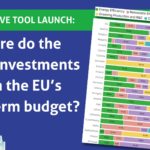To: Executive Vice President Commissioner for an Economy that works for the People, European Commissioners for Budget and Economy
Copy: Executive Vice President for the European Green Deal, European Commissioners for Climate and International Partnerships
Dear Commissioners,
We are writing in the context of the Economic and Financial Affairs (ECOFIN) Council Conclusions on Climate Finance, to be adopted on 17 October 2023.
The IPCC Sixth Assessment Report highlights the growing economic costs of inaction and the urgency of aligning financial flows with the Paris Agreement goals. There is a vast and growing gap between the climate finance needs of countries and communities in the Global South and the current scale of and access to climate finance, which is increasing inequalities and poverty, and weakening global action on mitigation, adaptation and loss and damage. Ahead of COP28 where progress on finance will be integral to the whole agenda and critical to rebuild the trust, we would like to share the following recommendations:
1. Developed countries, the EU and its Member States, should ensure that the annual USD 100 billion climate finance goal will be met and disbursed on average over 2020-2025, making up for shortfalls in earlier years in later years of delivery;
2. Developed country parties to the UNFCCC should present a definitive roadmap for a collective doubling of adaptation finance by 2025, based on 2019 levels, as a stepping stone to achieving a balance between mitigation and adaptation finance and in line with the commitment made at COP26;
3. The EU should set out concrete pathways to increase its collective climate finance in line with its fair share, and scale up adaptation finance, including through the EU budget; we recommend supporting, as a bare minimum, the European Commission proposal to bolster resources allocated to Heading 6 in the EU budget Mid-Term Review.[1]
The EU should support strong decisions at COP28 to operationalise the Loss and Damage Fund and deliver new and additional financing:
4. The Loss & Damage fund should be the centrepiece of new and existing funding arrangements, and address a wide range of economic and non-economic needs including immediate post-disaster relief, rehabilitation and reconstruction, and allow for direct access to finance for local communities
5. The Fund should be designated as an operating entity of the financial mechanism under Article 11 of the Convention and Article 9 of the Paris Agreement, accountable to the Conference of the Parties and the Conference of Parties serving as the meeting of the Parties to the Paris Agreement. The EU should oppose the World Bank hosting the Fund, given its lack of fair and democratic representation of impacted countries and communities;
6. EU Member States and the European Commission should be ready to make significant multi-year pledges at a scale of billions of USD to the new Loss and Damage fund by or at COP28. Finance should be new and additional public funding in the form of grants.
There is an urgent need for new resources for climate action in the EU and internationally:
7. The EU should support the introduction of global, EU and national taxes and levies designed according to the Polluter Pays Principle, global and social equity;
8. EU Member States should contribute an increased share of revenues from the current ETS and the revised ETS1, and support new forms of fossil fuel taxation, aviation and maritime taxation and levies, an EU financial transaction tax and wealth taxes, from which a share of revenues should be dedicated to climate finance.[2]
The EU should play a constructive role in the New Collective Quantified Goal negotiations:
9. The EU should support a quantum for the provision of public finance to meet support needs which is truly new and additional to ODA commitments, and which is science- and developing country needs-based; taking the form of a matrix of sub-goals for mitigation, adaptation and addressing loss and damage.
The international financial architecture is not fit to address the climate crisis. The EU should play a role to ensure the Global Stocktake propels reform, via a call to action to multilateral development banks (MDBs) and international financial institutions (IFIs). Moreover:
10. As a major shareholder at IFIs and MDBs, the EU should build on the track record of the EIB, and support the swift adoption of comprehensive and loophole-free fossil fuel exclusion policies, and stronger climate and biodiversity finance targets. Banks should also implement robust human rights safeguards and more democratic governance structures including mechanisms for participation of and monitoring by developing countries, Indigenous Peoples, civil society, and communities;
11. EU member states should support a reform of the formula determining IMF voting power and quota to ensure more democratic international economic governance and echo the demand for a new issuance of special drawing rights, without any policy conditionalities attached, as new and additional finance to address the climate and debt crises.
Shifting all financial flows to align with Paris Agreement objectives:
12. The Sharm el-Sheikh Dialogues on Article 2.1c offer an opportunity to outline an equitable approach to international financial reform including phasing out public and private fossil fuel finance, and action on debt and tax justice;
13. Parties should commit to phase-out all fossil fuel subsidies, as soon as possible and with developed countries taking the lead;[3] the EU should refrain from weakening phaseout commitments by using qualifying language such as ‘environmentally harmful’;
14. To build economic resilience and demonstrate action in the EU, reform of EU economic governance, which you will also discuss on 17 October, is key. National fiscal-structural plans must integrate a socially just and timebound reduction of fossil fuel and environmentally harmful subsidies and respect the Do No Signficant Harm Principle. The European Semester should support Member States to embrace green budgeting tools.[4]
We hope you can take these recommendations into consideration.
Yours sincerely,

Chiara Martinelli, Director, Climate Action Network (CAN) Europe
Download the full letter here.
[1] In June 2023, the European Commission proposed a €10.5 billion increase to Heading VI of the EU budget
[2] See CAN Europe New Resources for public climate finance and for the Loss and Damage Fund
[3] See CAN Europe publication: Fossil Fuel Subsidies in the EU
[4] For full recommendations, see CAN Europe & EEB briefing on the EU Economy Governance Review



